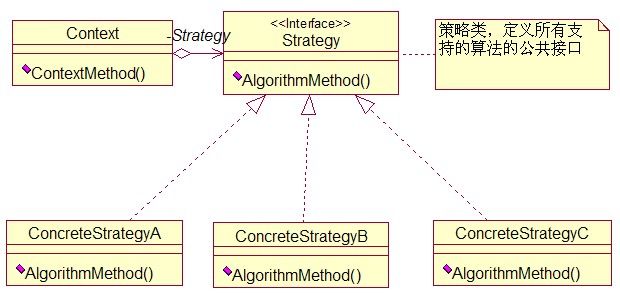锦囊妙计之策略方法模式的应用
1、策略模式完善模板方法模式处理DAO中的查询方法
建议先看模模板方法模式在项目中的应用一节,再与本节对比.
1.1 新建RowMapper接口,定义mapRow(ResultSet rs)方法.
public interface RowMapper {
public Object mapRow(ResultSet rs) throws SQLException;
}
1.2把抽象类AbstractDao改成JdbcDaoTemplate类.
public class JdbcDaoTemplate {
//RowMapper是一个接口类,调用此方法时需传入对应的实现类
public Object find(String sql, Object[] args, RowMapper rowMapper) {
Connection conn = null;
PreparedStatement ps = null;
ResultSet rs = null;
try {
conn = JdbcUtils.getConnection();
ps = conn.prepareStatement(sql);
for (int i = 0; i < args.length; i++)
ps.setObject(i + 1, args[i]);
rs = ps.executeQuery();
Object obj = null;
if (rs.next()) {
obj = rowMapper.mapRow(rs);
}
return obj;
} catch (SQLException e) {
throw new DaoException(e.getMessage(), e);
} finally {
JdbcUtils.free(rs, ps, conn);
}
}
}
1.3 将UserDaoImpl类改成如下 :
public class UserDaoImpl {
JdbcDaoTemplate template = new JdbcDaoTemplate();
public User findUser(String loginName, String password) {
String sql = "select id, name, money, birthday from user where name=?";
Object[] args = new Object[] { loginName };
RowMapper mapper = new UserRowMapper();
Object user = this.template.find(sql, args, mapper);
return (User) user;
}
//根据用户id查找对应的用户名
public String findUserName(int id) {
String sql = "select name from user where id=?";
Object[] args = new Object[] { id };
//通过匿名内部类实现RowMapper接口 策略二:返回的是一个子符串
Object name = this.template.find(sql, args, new RowMapper() {
public Object mapRow(ResultSet rs) throws SQLException {
return rs.getString("name");
}
});
return (String) name;
}
}
//内部类实现的RowMapper接口 策略一:返回的是一个User实体对象
class UserRowMapper implements RowMapper {
public Object mapRow(ResultSet rs) throws SQLException {
User user = new User();
user.setId(rs.getInt("id"));
user.setName(rs.getString("name"));
user.setMoney(rs.getFloat("money"));
user.setBirthday(rs.getDate("birthday"));
return user;
}
}
RowMapper 接口对应的角色是抽象策略,此角色定义了策略类所需的接口.
UserRowMapper 对应的是具体策略角色,该角色给出对抽象策略的具体实现.
JdbcDaoTemplate 对应的是环境角色,持有一个抽象策略接口的引用.
UserDaoImpl
是使者该策略的角色.
代码表现如下:
2.1 定义接口
/**
* 抽象策略(角色):此角色给出所有的具体策略类所需的接口
* @author Administrator
*
*/
public interface Strategy {
//抽象策略(算法)
public String strategyInterface();
}
2.2 编写环境角色
/**
* 环境(角色):持有一个Strategy类的引用
* @author Administrator
*/
public class Context {
private Strategy strategy;
//通过将子类对象引用赋值给超类对象引用变量来实现动态方法调用
public Context(Strategy strategy){
//初始化时,传入具体的策略对象
this.strategy = strategy;
}
public String getResult(){
return strategy.strategyInterface();
}
}
2.3编写具体策略角色A
/**
* 具体策略角色A
* @author Administrator
*
*/
public class ConcreteStrategyA implements Strategy {
public String strategyInterface() {
return "算法A的实现";
}
}
2.4编写具体策略角色B
/**
* 具体策略角色B
* @author Administrator
*
*/
public class ConcreteStrategyB implements Strategy {
public String strategyInterface() {
return "算法B的实现";
}
}
2.5编写使用者:测试类
public class StrateryTest {
public static void main(String[] args) {
Context context = new Context(StrategyFactory.getStrategyA());
System.out.println(context.getResult());
context = new Context(StrategyFactory.getStrategyB());
System.out.println(context.getResult());
context = new Context(StrategyFactory.getStrategyC());
System.out.println(context.getResult());
}
}
打印结果:
算法A的实现 算法B的实现 算法C的实现
3、策略方法模式的优缺点:
优缺: 当业务逻辑存在多个判断语句时,使用该模式可以转移if语句.
缺点: 当if语句很多的时候,就会造成编写很多的具体策略类.
